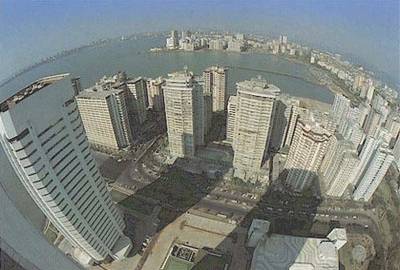 |
The next story brings us into a completely different
world: we are now in Cabo San Lucas, Mexico.
The author Darrin Bird, originally from New Zealand, writes his
submission in his house by the beach, which is at the same time his workplace.
As he describes his reality and we can imagine that this place is where
lots of us long to be while sitting in unpersonal university auditoriums
or uncomfortable and cold offices with work piling up on the desk. He sees
a "shaded patio that frames the garden beyond", where "plamtrees shimmer
with strokes of green and yellow accented with white reflected light".
He compares his "screen door" with "canvas", his garden as "a natural painting".
He seems to have found what many of us are looking for: a beautifully relaxing
place to live and work. |
|
The next submission I will interprete is a poem, written
by a 15-year-old girl called Sonia Budgen. She is living in Hobart, Tasmania.
The poem starts as follows: "As I look out of the window, I see
nothing. Not a tree, not a cloud, not a person, not a soul." The poem continues
this way. She makes a list of all the things she does can't see. While
reading the first lines, one might wonder what sort of place this could
be, without any movement and life. It comes across like a different world.
Only in the last line we discover that she is blind: "I wish I wasn't blind,
but that's the way god made me." I think Sonia's poem is a very important
contribution to the noon quilt. It treats a new aspect of the "view", that
is that there is none. The intention of the author is probably to remind
people that they should appreciate to be able to see. A piece of poetry
like this should make us realise that an ugly view out of the window or
discontentment about the job situation is something changeable and lies
in our hands. Sonia's situation however is something she has to accept
and she doesn't even really complain about her fate, which is very admirable. |

